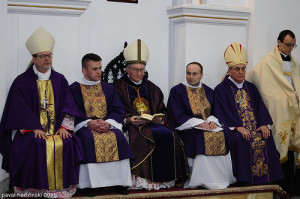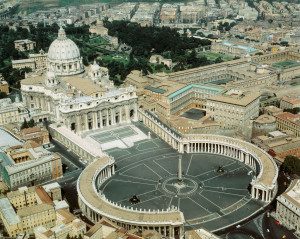Popemobile Gives Lukashenko a Ride
The Vatican’s Secretary of State, Cardinal Pietro Parolin, announced that the Holy See is ready to facilitate a rapprochement between Belarus and the European Union. President Aleksandr Lukashenko has ruled Belarus for over 20 years and is known in the West as the “last dictator of Europe.” His country’s human rights record and political crackdown during the last election in 2011 have lead many European countries to impose a travel ban on him. Ever since then, Belarus has been ostracized from Western forums. Lukashenko has remained steady in his authoritarian rule, maintained a Russia-oriented foreign policy, and kept the EU at arm’s length. However, Lukashenko’s key role in pushing for peace in the Ukrainian conflict has raised his prestige and respect among the EU. Lukashenko famously hosted the latest 4-way talks between the leaders of France, Germany, Ukraine and Russia that produced the “Minsk II” accord. Amid the current geopolitical environment, certain EU politicians have alluded to extending an olive branch to Belarus, and it appears that the Vatican is more than willing to help the two normalize relations.

The Holy See, under the Papacy of Pope Francis I, has engaged in serious diplomatic processes. In December, both Presidents Barack Obama and Raúl Castro of Cuba gave credit to Pope Francis I for his pivotal role in brokering the talks between the two countries. Last summer, the Pope hosted President Mahmoud Abbas of the Palestinian Authority and former President Shimon Peres of Israel in a bid to pray for peace. The Holy See and the People’s Republic of China do not have official diplomatic relations, but Pope Francis has insisted that he wants to begin talking with the country’s leadership. The Vatican’s diplomacy is geared towards personal diplomacy, where enemies can come together to discuss their differences in efforts to seek a solution. Now, the Vatican is ready to relax tensions in the European continent by aiding the EU-Belarus dialogue.
The European geopolitical layout changed drastically in 2014, following the fall of Ukraine’s Viktor Yanukovych and Russia’s annexation of the Crimean peninsula. Pledges from the Russian Federation to protect the “Russian world” struck fear into peripheral countries with sizeable Russian populations – including Belarus. The nerve-racking environment of early 2014 has died down, but Ukraine is still simmering and all parties are involved in making sure that Minsk II holds.
Belarus’s special role in bringing about this lull has made it attractive for the EU, so the diplomatic process promises a convergence of interests. Nonetheless, discussions between the EU and Belarus are likely to stumble over Belarus’s deplorable human rights record. Historically, Belarus has jailed journalists and members of the political opposition, forcing the opposition into an uphill battle versus the state--aspects of internal governance that make European idealists uneasy. The Vatican, nonetheless, helped the United States and Cuba come to an understanding, in spite of the US’s open disdain for the Cuban regime, so that the two may coexist peacefully. Perhaps the world can expect the Holy See to push for a similar deal with Belarus.
The progress of these talks, if any, will most likely be gradual. Brussels’s overture to Minsk, in the context of Belarus’s avid bids for peace in Ukraine, raises several questions. What will happen to this process if the conflict in Ukraine is finished? Will the EU still push for a lenient human rights deal in exchange for political expediency with Lukashenko? Belarus is not reaching out to the EU in a bid to leave Moscow’s orbit – it is still a founding nation of the Eurasian Economic Union and formally in a Union State with Russia. In the most recent summit, the EU mulled the idea of creating a common currency for the bloc. It remains to be seen whether the thaw in Belarus-EU relations will be a genuine process, and whether it will last in light of the conflict in Ukraine or the abysmal state of EU-Russia relations.


